Evolving, Transforming – Today’s Library!
Pat Thibodeau, Associate Dean for Library Services & Archives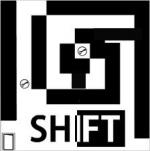
Our Medical Center Library & Archives continues to evolve and transform in physical as well as virtual ways! We have already undergone significant changes over the past 10 years with online databases and journals, as well as re-allocating our spaces to other functions within the Mudd building. However, our world is still shifting due to e-books, mobile devices, and increasing use of our space.
Here is what our future holds:
- E-books will be our primary source for text and reference books. Print use has drastically declined while online use has skyrocketed. We've already made a big change with the addition of ClinicalKey and we're now trying to fill in the gaps by purchasing e-versions of our most popular books. You will see fewer and fewer new print books in our stacks.
- Mobile devices in our loaner program are continuing to evolve and while we have a few kindles left, we have quickly transitioned to iPads that faculty and students can borrow and try out. We will be upgrading this iPad pool to newer versions.
- Mobile lab and flexible training areas have been developed! In response to support of an EBM workshop, we experimented with setting up a mobile laptop lab to support our training outside the Library. This will allow us to provide training when it is easier for us to come to the users! In addition, Room 212E has been converted to a flexible training space so that librarians can quickly set up a small group session for hands-on instruction or for a traditional presentation. When not in use, this is another flexible study space.
- More study space is needed! Our Library is often full, which is wonderful for us, but can be frustrating if trying to find a space for study or research. We are working on a proposal that would move the older journal collection on Level 3 to storage and create more individualized study spaces to meet the growing demand. Our free scanning service will continue to provide access to the stored journal collection.
So watch as we continue to evolve in response to your needs and our changing digital environment. Your continued feedback will guide future transformations!
African Americans in Civil War Medicine Exhibit
Binding Wounds, Pushing Boundaries: African Americans in Civil War Medicine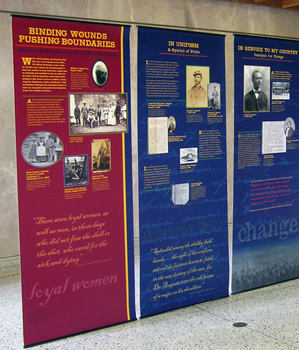
Medical Center Library & Archives - Level 2R
On Display June 9 - July 19, 2014
The Medical Center Library & Archives is pleased to announce that we will host "Binding Wounds, Pushing Boundaries: African Americans in Civil War Medicine," a six-banner traveling exhibition developed and produced by the Exhibition Program at the National Library of Medicine with research assistance from The Historical Society of Washington, D.C. The exhibit will be on display from June 9th - July 19th on Level 2R of the Medical Center Library & Archives.
This exhibit will feature African-American men and women who served as surgeons and nurses during the American Civil War and how their service as medical providers challenged the prescribed notions of race and gender, pushing the boundaries of the role of African Americans in America. Many histories have been written about medical care during the Civil War, but the participation and contributions of African Americans as nurses, surgeons, and hospital workers has often been overlooked.
A companion exhibit on "Civil War Medicine" will also be on display through September 2014 on Level 1 featuring collections from the History of Medicine and the Rubenstein Rare Book & Manuscript Library.
In conjunction with these exhibitions, Margaret Humphreys, Josiah Charles Trent Professor in the History of Medicine at Duke, will speak on "Finding Dr. Harris: an African American Surgeon in the US Civil War." Wednesday, June 18 at 12 noon; Reading Room, Level 1. All are welcome to attend. Light refreshments will be served.
Dr. Margaret Humphreys to Speak on June 18th
 |
Dr. Margaret Humphreys, Josiah Charles Trent Professor of the History of Medicine and Professor of Medicine at Duke University, is the current President of the American Association for the History of Medicine. Her most recent book, "Marrow of Tragedy: The Health Crisis of the American Civil War," was a finalist for the Gilder Lehrman Lincoln Prize, awarded annually for the finest scholarly work in English on Abraham Lincoln or the American Civil War era.
Dr. Humphreys’ talk, "Finding Dr. Harris: An African American Surgeon in the US Civil War," coincides with the National Library of Medicine's traveling exhibit, Binding Wounds, Pushing Boundaries: African Americans in Civil War Medicine, on display on Level 3 from June 9 - July 19, 2014. A companion exhibit on "Civil War Medicine" will also be on display through September 2014 on Level 1 featuring collections from the History of Medicine and the Rubenstein Rare Book & Manuscript Library.
Planning For Your Fall Semester? We Can Help!
Megan von Isenburg, Associate DIrector, Research & Education
We can help you plan your fall semester, journal club, or new academic year of instruction!
Research and Education Librarians are available to guest lecture within your curriculum. We offer instruction on a number of topics, including:
- Finding the best evidence

- Resources for clinical care
- Searching PubMed
- Searching CINAHL
- Working towards publication
- Using EndNote or other reference management tools
We are happy to customize sessions for your discipline and needs. New this year - We can even bring our mobile classroom to you to facilitate active learning!
It’s never too early to plan for the summer and fall. Get started by contacting your liaison librarian or by emailing medical-librarian@duke.edu.
Featured Guide: Test Instruments
Ever needed a validated instrument for a research project? Instruments are notoriously difficult to find, and many are copyright-protected and only available for a fee.
The revised Test Instruments Guide includes the following areas to help simplify the process of finding these instruments.
Databases, including HaPI (Health and Psychosocial Instruments) and PsycTESTS, allow you to search for instruments by topic or name.
Web Resources may also offer some freely-available instruments and measures on your topic area.
Print Resources are more difficult to use, but may help you find instruments not indexed in databases nor available online.
Duke Instruments have been authored at Duke or by Duke departments, including the "Duke Social Support Index" and others. Current contact information is provided and links to full text where available.
Searching Help offers videos and Web guides to assist in searching databases such as CINAHL and PsycTESTS.
If you need help finding an instrument for your project, be sure to contact the Library at 919.660.1100 or medical-librarian@duke.edu.
NIH Public Access Policy: Tips for Staying Compliant
Pat Thibodeau, Associate Dean for Library Services & Archives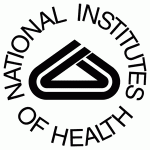
The NIH Public Access Policy requirements are here to stay, and it is crucial for PIs and authors on NIH funded articles to ensure they are up-to-date and monitoring their compliance status.
Remember that you only have 90 days after the article is published to be compliant, so staying on top of the status of every article connected with your grant is key! This applies to articles cited in new submissions and biosketches, as well as non-competing renewals.
Here are some tips that will help you stay compliant!
1. Very best practice!
Immediately submit your manuscript files to NIHMS when your article is accepted for publication since you'll have the files and all the information! After it is published, add it to "My Bibliography" and you are ready to track its status!
2. Create a saved search in PubMed under your name and grant number so that you are notified as soon as the article is published and identified by NIH!
Add articles to your "My Bibliography" account to see what the status is, and make sure the PubMed ID number (PMID) is correctly assigned. Remember, you only have 90 days after publication to be compliant.
3. Respond to all emails from NIHMS!
NIHMS may be asking for approval or reporting a problem with your manuscript that needs attention.
4. Set up a schedule
Put a reminder in your calendar (e.g. the first Monday of every month) to check on the status of your articles in "My Bibliography" and NIHMS.
5. Watch for reminders from us (the Library) about compliance issues!
We try to send out a report about every two weeks for new publications and ones needing your attention. We also try to send out reminders in advance of RPPR deadlines. So please watch for these helpful notices from us.
Need Help? Call the LIbrary Service Desk at 919.660.1100 or contact us via email or chat. We can help set up accounts, sort out problems with submissions, and answer other compliance questions.
Findings from a Study of Duke Researchers
Emily Mazure, Biomedical Research Liaison
The Medical Center Library & Archives has held focus groups in the past 1.5 years to explore the research needs of early-career researchers.
What have we learned at this point?
We conducted four focus groups in which we had a total of 12 participants: 2 graduate students, 5 postdocs, and 5 faculty. The overarching theory we developed was that participants were unaware of or didn't understand many tools, services, and resources available to them through the University and/or Library.
In support of the larger theory above, participants reported that:
- Finding collaborators was difficult
- Navigating the research process and structure was confusing
- Navigating the grant lifecycle was complex
- Finding and obtaining help at Duke was challenging
- Training was of interest, especially statistical
- Close colleagues were relied upon for guidance and answers
- Time and desire was lacking for finding contact information, articles, forms, etc.
- Identifying good mentors was crucial to navigating Duke and their career
How do our results factor into CTSA and what is happening at Duke?
The largest portion of the funding for the CTSA (Clinical and Translational Science Awards) at Duke will be directed towards funding infrastructure to support research. In particular, two projects - MyResearchHome@Duke and MyResearchTeam@Duke - have the potential to provide solutions to many of the issues we heard participants describe. MyResearchHome@Duke will be designed as a single portal that all research faculty and staff can use to find resources and answers to questions they have about the research process at Duke. MyResearchTeam@Duke will provide support to researchers who currently lack adequate departmental support to navigate the research process or who need assistance with basic research design, statistical methods, and management of projects.
How does what we learned affect the Library?
The Library can provide services and resources designed to raise awareness and offer guidance to help early career researchers understand what is available to them. There are institutional efforts to provide tools to help researchers find resources and services at Duke from the CTSA grant. We should participate in these larger long-term efforts, while at the same time providing more immediate, customized services and resources to meet these needs. Possible immediate services include:
- Targeted training and promotion of Library services and resources for particular groups like postdocs
- Development of new strategies for communication and marketing, designed for particular groups or needs
- Promotion and development of resources we already have like Scholars@Duke, Web of Science, Scopus, LibGuides on relevant topics, etc.
What questions still exist?
- What (if any) methods and formats of communication are preferred and effective?
We heard in a variety of ways and from multiple people that they desired more or better communication, but the preferred format and methods seemed to differ or be unknown to individuals. Is there any ideal way to reach out to people and increase awareness?
- How do we change how people view the Library? Should we?
People typically associate the Library with access to books and journals, but are less likely to think of us when they need help searching the literature, organizing their information, etc.
 If you have questions or comments about this study, please email the Library at medical-librarian@duke.edu.
If you have questions or comments about this study, please email the Library at medical-librarian@duke.edu.
Special thanks for the support and collaboration from the Duke Office of Clinical Research and the Duke Office of Research Informatics.
Featured New E-Books
Barbara Dietsch, Acquisitions & Cataloging Manager, Collection Services
Here are a few selected e-book titles from the R2 Digital Library that have been recently added to our collection. These reviews are excerpted from Amazon.com.
 Leadership for Health Professionals: Theory, Skills, and Applications
Leadership for Health Professionals: Theory, Skills, and Applications
Gerald R. Ledlow and M. Nicholas Coppola
This is reportedly the first textbook of its kind to apply classical knowledge of leadership theory and time-honored best practices of industry leaders to a health organization context. The comprehensive and well-organized text is grounded in real-world applications of theoretical concepts and focuses on practical examples of leadership practice in actual healthcare scenarios.
Initiating and Sustaining the Clinical Nurse Leader Role: A Practical Guide
James L. Harris, Linda Roussel, and Patricia Thomas
This revised reference focuses on the evolution of the CNL role and creating a greater interprofessional collaboration with the community, as well as academic and clinical partners. The text emphasizes interprofessional collaboration, accountability care organizations, transitions in care, evidence-based practice, and improvement science.
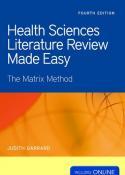 Health Sciences Literature Review Made Easy: The Matrix Method
Health Sciences Literature Review Made Easy: The Matrix Method
Judith Garrard
The fourth edition of this text provides students with a solid foundation and the tools needed to evaluate articles and research effectively. It builds on the digital updates made to the previous edition and highlights the Matrix Method and skills necessary to critically evaluate articles. It also covers Method Maps, which teach students how to effectively construct a research study. Students are lead through the process of how to manage a quality literature review in the context of evidence-based practice.
 Knowledge Translation in Health Care: Moving from Evidence to Practice
Knowledge Translation in Health Care: Moving from Evidence to Practice
Sharon Straus, Jacqueline Tetroe, and Ian D. Graham
Using everyday examples, this practical introduction to knowledge translation explains how to use research findings to improve health care in real life. It includes relevant real world examples and cases of knowledge translation in action that are accessible and relevant for all stakeholders including clinicians, health policy makers, administrators, managers, researchers, clinicians and trainees.
 Essentials of Health Behavior: Social and Behavioral Theory in Public Health
Essentials of Health Behavior: Social and Behavioral Theory in Public Health
Mark Edberg
Health promotion, education, and prevention programs ultimately focus on changing health behavior. This book provides the groundwork for understanding, assessing, and effectively applying theories of human behavior within the practice of public health. In clear and accessible language, it provides the student with a background of the kinds of social and behavioral theories that guide our understanding of health related behavior and form the background for health promotion and prevention efforts.
Suggestions for purchases? Complete our online Recommend a Purchase form or contact Emma Cryer. For a complete list of titles added to our book and ebook collections within the last 3 months, check out the Library's newest book additions or subscribe to our "New Books" feed.
DUMC Archives Resources Round-up
Jolie Braun, Assistant Director and Archives Librarian for Research, Outreach & Education
Duke University Medical Center (DUMC) Archives has a variety of online resources to help users learn about the collections and the Medical Center’s history.
MEDSpace – If you’re looking for historic images, our digital repository, MEDSpace, is an excellent place to start. MEDSpace contains nearly 700 photographs documenting the history of Duke Medicine, from the 1930s to the 1990s. You can also find early publications (such as the 1929 admission requirements and a 1939 Duke Nursing handbook), images of artwork (some featuring prominent people in the Medical Center’s history), and medical artifacts.
Digitized Yearbooks – Want to look up a faculty member, an old classmate, or maybe even yourself? Our entire collection of the Aesculapian, the Duke School of Medicine’s yearbook, has been digitized and made available online via DigitalNC. Browse or search 34 volumes spanning more than 60 years of Duke history, from 1950 to 2013.
Digital Exhibits – The Archives has several digital exhibits about key figures and events in the history of the Medical Center. Some of the topics include the Duke Poison Control Center, Dr. David Sabiston’s career and contributions to medicine, Dr. Wilburt C. Davison’s correspondence with Sir William Osler, and women in medicine at Duke.
DUMC Archives Subject Guide – Our subject guide provides a brief overview of the Archives, including information about our collections, how to find items, and suggested resources. We recommend it for anyone who is new to Medical Center Archives as an introduction to what we have and how we can help with your research or project.
DUMC Archives Blog – Updated regularly, our blog is the place to go for Archives news, information about exhibits and events, to get a glimpse at materials from our collections, and discover stories about the Medical Center’s history.
We hope you will check back frequently!
Staff News
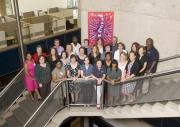 Megan von Isenburg, Associate Director for Research & Education, co-authored the “Global Health Sources” chapter in the newly published book, Introduction to Reference Sources in the Health Sciences, 2014.
Megan von Isenburg, Associate Director for Research & Education, co-authored the “Global Health Sources” chapter in the newly published book, Introduction to Reference Sources in the Health Sciences, 2014.
Medical Center Library & Archives staff presented the following initiatives during the Annual Meeting of the Medical Library Association in Chicago, IL, May 18-20, 2014.
Emily Mazure, Patricia Thibodeau, Virginia Carden, Emma Cryer, Adrianne Leonardelli, Beverly Murphy, Connie Schardt (retired), and Rick Peterson (retired) - NIH Public Access Policy: A Learning Opportunity (Poster)
Beverly Murphy, Elizabeth Berney, Jolie Braun, Virginia Carden, Emma Cryer, Adrianne Leonardelli, and Patricia Thibodeau - Rip and Renew: Renovating our Brand from the Ground Up (Poster)
Beverly Murphy and Virginia Carden - Building Blocks for the Future: Reflections from MLA Leaders (Poster)
Patricia Thibodeau, Elizabeth Berney, Emma Cryer, and Barbara Dietsch - Leisure Reading: Validating Selection Decisions and Identifying Reader Preferences (Poster)
Megan von Isenburg and Jean Ferguson (Duke University) - Surveying the Landscape: A Bibliometric Analysis of Global Health Literature (Poster)
Improve Your Library Research Skills!
The Medical Center Library offers training on a variety of topics. Sign up for an upcoming class, customize your own, or schedule an appointment for a research consultation.
Publication Schedule & Staff
Duke University Medical Center Library & Archives News is published bimonthly.
| Pat Thibodeau, Associate Dean | Beverly Murphy, Editor |
| Editorial Board: | |
| Jolie Braun | Barbara Dietsch |
| Adrianne Leonardelli | Megan von Isenburg |
Subscribe to our newsletter and be notified when a new issue is published!

